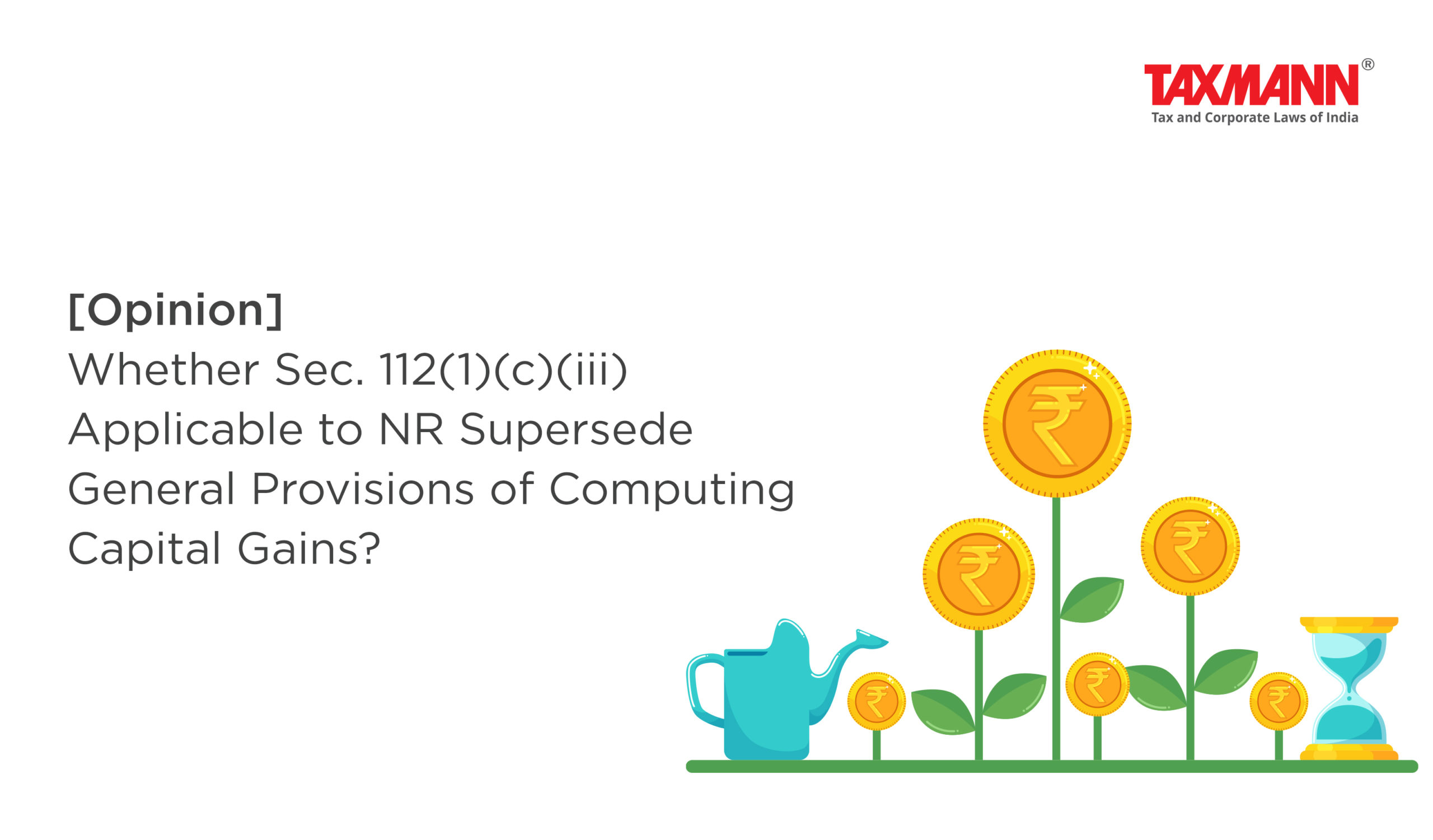[Opinion] Whether Sec. 112(1)(c)(iii) Applicable to NR Supersede General Provisions of Computing Capital Gains?
- Blog|News|Income Tax|
- 3 Min Read
- By Taxmann
- |
- Last Updated on 19 May, 2023

CA Mukesh Kohli – [2023] 150 taxmann.com 288 (Article)
Introduction
There is a debate among Tax professional whether provisions of Section 112(1)(c)(iii) will be applicable in case of Non-Resident who earns capital gain from transfer of unlisted shares and securities instead of normal provisions under section 48 of the Income Tax Act,1961.
Let as first discuss section 48 and 112 (1)(c)(iii) of income Tax Act, 1961.
Section 48
The income chargeable under the head “Capital gains” shall be computed, by deducting from the full value of the consideration received or accruing as a result of the transfer of the capital asset the following amounts, namely
i. Expenditure incurred wholly and exclusively in connection with such transfer.
ii. the cost of acquisition of the asset and the cost of any improvement thereto.
iii. in case of value of any money or capital asset received by a specified person from a specified entity referred to in sub¬section (4) of section 45, the amount chargeable to income-tax as income of such specified entity under that sub-section which is attributable to the capital asset being transferred by the specified entity, calculated in the prescribed manner.
Provided that in the case of an assessee, who is a non-resident, capital gains arising from the transfer of a capital asset being shares in, or debentures of, an Indian company shall be computed by converting the cost of acquisition, expenditure incurred wholly and exclusively in connection with such transfer and the full value of the consideration received or accruing as a result of the transfer of the capital asset into the same foreign currency as was initially utilised in the purchase of the shares or debentures, and the capital gains so computed in such foreign currency shall be reconverted into Indian currency, so, however, that the aforesaid manner of computation of capital gains shall be applicable in respect of capital gains accruing or arising from every reinvestment thereafter in, and sale of, shares in, or debentures of, an Indian company :
Provided further that where long-term capital gain arises from the transfer of a long-term capital asset, other than capital gain arising to a non-resident from the transfer of shares in, or debentures of, an Indian company referred to in the first proviso, the provisions of clause (ii) shall have effect as if for the words “cost of acquisition” and “cost of any improvement”, the words “indexed cost of acquisition” and “indexed cost of any improvement” had respectively been substituted:
Provided also that nothing contained in the first and second provisos shall apply to the capital gains arising from the transfer of a long-term capital asset being an equity share in a company or a unit of an equity-oriented fund or a unit of a business trust referred to in section 112A:]
Provided also that nothing contained in the second proviso shall apply to the long-term capital gain arising from the transfer of a long-term capital asset, being a bond or debenture other than—
(a) capital indexed bonds issued by the Government; or
(b) Sovereign Gold Bond issued by the Reserve Bank of India under the Sovereign Gold Bond Scheme, 2015.
Provided also that in case of an assessee being a non-resident, any gains arising on account of appreciation of rupee against a foreign currency at the time of redemption of rupee denominated bond of an Indian company [held] by him, shall be ignored for the purposes of computation of full value of consideration under this section.
Click Here To Read The Full Article
Disclaimer: The content/information published on the website is only for general information of the user and shall not be construed as legal advice. While the Taxmann has exercised reasonable efforts to ensure the veracity of information/content published, Taxmann shall be under no liability in any manner whatsoever for incorrect information, if any.

Taxmann Publications has a dedicated in-house Research & Editorial Team. This team consists of a team of Chartered Accountants, Company Secretaries, and Lawyers. This team works under the guidance and supervision of editor-in-chief Mr Rakesh Bhargava.
The Research and Editorial Team is responsible for developing reliable and accurate content for the readers. The team follows the six-sigma approach to achieve the benchmark of zero error in its publications and research platforms. The team ensures that the following publication guidelines are thoroughly followed while developing the content:
- The statutory material is obtained only from the authorized and reliable sources
- All the latest developments in the judicial and legislative fields are covered
- Prepare the analytical write-ups on current, controversial, and important issues to help the readers to understand the concept and its implications
- Every content published by Taxmann is complete, accurate and lucid
- All evidence-based statements are supported with proper reference to Section, Circular No., Notification No. or citations
- The golden rules of grammar, style and consistency are thoroughly followed
- Font and size that’s easy to read and remain consistent across all imprint and digital publications are applied



 CA | CS | CMA
CA | CS | CMA
